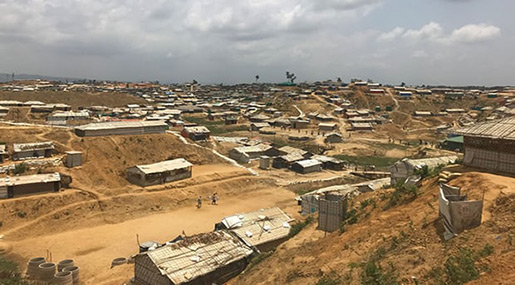
Now Rohingya Refugees Are Threatened By Monsoons. Britain Must Help

Jo Stevens
None of us can be ignorant of the desperate situation facing the Rohingya people - it is one of the greatest humanitarian crises of recent times. I have been to the refugee camps on Bangladesh-Myanmar border, where almost 1 million Rohingya refugees are in temporary shelters. I met refugees who have fled unspeakable levels of violence and systematic abuse, including the murder of entire villages by the Myanmar military. This latest atrocity is the result of a sustained campaign of marginalization and discrimination that started decades before the August 2017 genocide. I support a referral to the international criminal court. The UK government doesn't.

In Bangladesh, these people now face a second tragedy as the monsoon season hits and threatens to wipe out even more lives. Aid agencies estimate that 100,000 people are at severe risk of mudslides and flooding in the largest camp I visited, Kutupalong. Their shelters - which are actually just bamboo and tarpaulin - will be no match for monsoon rains and will simply be washed away. The lack of clean water and inadequate sanitation also increase the risk of water contamination and outbreaks of diseases, such as cholera, that could devastate the camp population.
Basic services are also in danger; 32% of health facilities could be lost, and a quarter of the nutrition centers are threatened, putting the lives of the 60,000 women reported to be pregnant - many of them as a result of rape - and their babies at risk of malnutrition and subsequent difficulties through birth and in feeding their newborn children. The rapid and unplanned growth of the camps makes the response challenging. But there are opportunities to improve the situation.
That is why I am leading a debate in parliament on Tuesday and I will be pressing the Foreign Office minister to take urgent action, before many tens of thousands of people, including children, lose their lives. The UK has been, and continues to be, a leader in the financial response in Bangladesh, having given £59m to help the global efforts, and pledged a further £70m. Money alone, however, will not solve this immediate crisis. This reality demands the UK takes a position of political leadership in addressing the crisis on both sides of the border.
UN and other aid agencies are being held up by red tape as they try to gain access to the camps. We must work with the government of Bangladesh to register international organizations more quickly so they can work and deliver services in the camps. This will allow technical experts to support the Bangladeshi response. Without this expertise, almost half a million people will continue to be unable to access services such as health facilities, food support and education.
The Rohingya have an inalienable right to return to Myanmar and this must be protected. It is vital therefore that steps are taken to address the conditions that have forced, and continue to force, people to flee. The findings of the Annan commission on Rakhine provide a nationally and internationally endorsed framework designed to address the marginalization of the Rohingya. It is vital that the UK, in partnership with regional actors, supports the progressive implementation of the findings by the Myanmar government. Progress on ensuring Rohingya citizenship must be a priority.
In the longer term, the international community must work with the government of Bangladesh to define, agree and finance a response to the crisis that supports both refugees' self-reliance as well as contributing to improved conditions for host communities and to Bangladesh's own development objectives. Agreements reached with other refugee-hosting nations, including Jordan, Lebanon and Ethiopia, provide an indication of what can be achieved with the right package of support combined with strong partnerships.
The UK government has paid lip service to some of these issues, but now is the time for action. The monsoon season is already beginning. For many tens of thousands of refugees it will soon be too late.
Source: The Guardian, Edited by website team
Comments



